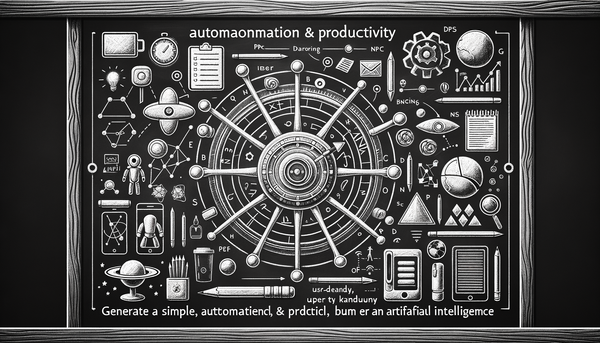AI Integration: Transforming Healthcare and Empowering Economies

This article examines how artificial intelligence is revolutionizing various sectors—from asset management in real estate and revitalizing America’s small towns, to streamlining enterprise productivity, transforming customer success strategies, reshaping legal practices, and pioneering healthcare diagnostics. It also examines the need for robust privacy standards and ethical oversight to ensure that AI remains a force for good in a rapidly evolving technological landscape.
AI as a Catalyst for Transformation
Artificial intelligence is no longer confined to the pages of science fiction—it is dynamically integrated into our everyday business, legal, healthcare, and public sectors. In its journey from an innovative concept to a cornerstone of modern efficiency, AI is not only changing how companies operate but also redefining the economic outlook of entire communities. Reflecting on its transformative power, I often think of Andrew Ng’s famous observation:
"Artificial intelligence is the new electricity." – Andrew Ng
Just as electricity revolutionized industry in the last century, AI is poised to remake our world in ways that are both subtle and revolutionary.
Revolutionizing Real Estate and Asset Management
The strategic partnership between Mitsubishi Estate and UptimeAI is a compelling example of AI-driven innovation in asset management. By harnessing predictive analytics and deep learning algorithms, Mitsubishi Estate aims to transition from a reactive to a proactive maintenance model. This collaboration, as reported by Morningstar, leverages UptimeAI's cutting-edge technology to reduce asset downtime, enhance tenant experiences, and drive operational excellence.
Using advanced analytical tools, the partnership capitalizes on predictive maintenance, which anticipates equipment failures before they occur—often cutting maintenance costs by over 30%. As the real estate sector grapples with high operational challenges, such an integration of AI not only helps in optimizing asset performance but also paves the way for smarter urban planning and sustainable development. For more on diversified AI transformations, check out our latest discussion in AI Transformations Across Diverse Sectors.
Empowering America's Small Towns through AI
While urban centers have long been the epicenters of technological innovation, a transformative wave is sweeping into America’s most modest communities. According to recent insights from RealClearMarkets, AI is beginning to play a pivotal role in economic revitalization in small towns. Historically plagued by population drain and limited resources, these communities now have the opportunity to reimagine their futures via automation and technologically augmented operations.
Major tech companies like Amazon, Google, and Microsoft are earmarking billions of dollars for AI development. These investments signal a shift in economic paradigms—one that equips small businesses with the tools to operate as efficiently as their larger counterparts. The integration of AI could enable rural enterprises to automate tasks, optimize resource allocation, and compete on a national stage. Notably, this technological democratization helps bridge historical economic divides, fostering sustainable growth and job creation.
Through such innovations, even sectors like healthcare in rural communities stand to benefit—revitalizing under-resourced hospitals with AI-powered diagnostics and management systems. This dynamic shift underscores how AI is not merely an innovation for the privileged few but an equalizer that promises to enhance lives across the socioeconomic spectrum. For additional perspectives on AI’s impact on economic innovation, you might explore Leveraging AI for Growth and Innovation in Various Fields.
Boosting Enterprise Productivity and Enhancing Customer Success
Agentic AI Tools in Enterprise Software
Oracle NetSuite, for instance, has taken significant strides in integrating AI capabilities within its enterprise platform. At its SuiteConnect London event, the company unveiled new AI tools aimed at automating repetitive tasks such as data entry, financial operations, and even content creation like filling out forms and drafting emails. The introduction of features such as Text Enhance and the revamped Prompt Studio not only streamlines mundane tasks but also empowers IT developers and business leaders alike to fine-tune automated processes according to specific operational needs.
This leap in productivity is a boon for companies seeking to leverage data-driven insights while reducing overheads. With AI tools addressing complexities in financial monitoring—such as flagging anomalies and assisting real-time analytics—businesses can now redirect valuable human resources from time-consuming tasks to more strategic functions. This evolution in enterprise software mirrors the broader trend of flipping traditional business models to become agile and efficient in a digital economy, as further explored in our article on How AI is Shaping Industries and Economies.
AI-Enhanced Customer Success Strategies
Beyond internal productivity, AI is revolutionizing how businesses interact with their customers. Leveraging vast pools of data—including emails, support call transcripts, and customer interaction histories—AI platforms are transforming customer success (CS) strategies. As highlighted by Raconteur, AI empowers customer success managers by automating routine tasks and enabling them to concentrate on personalized, data-driven engagement with clients.
For example, advanced platforms now generate detailed customer health assessments and predictive analytics that can forecast churn rates or identify upselling opportunities. Such insights allow sales and support teams to deliver bespoke recommendations and improved service quality. The result? Enhanced customer retention, increased revenue from expansion channels, and an overall elevated brand experience.
A famous observation by Terry Pratchett comes to mind when reflecting on this integration:
"Real stupidity beats artificial intelligence every time." – Terry Pratchett
Yet in this context, the real genius lies in the efficient collaboration between human ingenuity and automated processes. For further insights on how AI-enhanced customer success is transforming business landscapes, please refer to our Real AI Solutions Helping People Now update.
Regulatory Challenges and the Call for Enhanced Privacy Standards
Notwithstanding the remarkable strides in AI innovation, the burgeoning field also faces significant policy and regulatory challenges. A report by the Federation of American Scientists, as detailed by The Stack, has drawn attention to the pressing need for improved privacy standards in the United States. The current regulatory climate, which mirrors a more laissez-faire approach, has the potential to undermine public trust if AI technologies are not adequately safeguarded against misuse.
The FAS emphasizes that without robust privacy and data-sharing regulations, the full potential of AI could remain unfulfilled. Their report outlines 22 actionable recommendations, including the establishment of an early warning system to monitor cybersecurity risks and mitigate threats related to malicious AI practices. Such protocols are deemed essential not only for protecting sensitive data but also for ensuring that AI innovations can be implemented safely and effectively.
These recommendations echo the broader concerns shared by multiple stakeholders, where the balance between rapid technological advancement and public safety is seen as critical. In this context, establishing standardized data-sharing protocols—a method already in practice in countries like the UK and Australia—could significantly propel AI adoption, especially in sensitive fields such as healthcare and national security.
Transforming the Legal Sector with AI Integration
Another compelling example of AI’s transformative power is its integration within the legal industry. LexisNexis’s CTO recently highlighted in Forbes that the adoption of AI is now indispensable for law firms seeking to remain competitive. The traditional legal landscape, known for its cautious pace with respect to technological change, is now experiencing a profound shift.
By automating tasks like legal research, document review, and even predictive case analysis, law firms are experiencing both enhanced efficiency and unprecedented accuracy. AI-powered tools sift through vast databases of legal documents at lightning speed, thereby enabling attorneys to craft better-informed legal strategies in record time. This synergy between automation and expert legal judgment creates a hybrid model in which human insight is bolstered by machine precision.
This integration is particularly effective in improving case outcome predictions using historical legal data, thereby allowing legal professionals to strategize more effectively. As the legal sector continues its digital transformation journey, the conviction that delaying AI adoption is not an option grows firmer. This evolution, as reported by Forbes, not only streamlines case management but also sets the stage for skyrocketing client satisfaction through improved service quality and tactical foresight.
Driving Innovation in Healthcare Diagnostics
Perhaps one of the most life-altering applications of AI lies in the healthcare sector. A recent breakthrough published on Nature.com details how researchers have successfully integrated a portable, fluorescence-based device with AI-powered analytical tools for the real-time monitoring of oral mucosal lesions—one of the early indicators of cancer.
The diagnostic device employs a 405 nm laser diode in conjunction with a UV-visible spectrometer to detect changes in specific endogenous fluorophores such as flavin adenine dinucleotide (FAD) and porphyrin. The fluorescence signals captured by the device, when analyzed using AI classifiers like Quadratic Discriminant Analysis (QDA), have demonstrated accuracies as high as 95.34% in distinguishing between normal tissue and oral squamous cell carcinoma.
This non-invasive, swift, and highly accurate method represents a paradigm shift in early cancer detection, moving away from traditional, invasive biopsy procedures. Not only does this technology promise to accelerate diagnosis and treatment, but it also holds the potential to dramatically improve patient outcomes and survival rates. The seamless fusion of advanced imaging techniques with sophisticated AI analytics exemplifies how technological innovation in healthcare is set to redefine clinical best practices.
Given the mounting challenges in early-stage cancer detection worldwide, this approach can be considered a game-changer. With further research and refinement, we may soon see a broader adoption of such AI-assisted diagnostic tools in clinical settings, potentially paving the way to more proactive and preventive healthcare.
Looking Ahead: AI’s Ongoing Journey and the Road to Integrated Success
As vivid examples from sectors like real estate, small-town economies, corporate productivity, customer management, legal practice, and healthcare diagnostics illustrate, AI's impact is both profound and far-reaching. From predictive analytics that empower asset managers to strategic legal insights that save time and money, AI is weaving itself into the very fabric of modern industry.
There's an undeniable beauty in seeing how artificial intelligence, when paired with human creativity and rigor, solves complex problems and creates opportunities that were once beyond imagination. The myriad of technological innovations being explored today promise to lead us into an era where operational excellence and human ingenuity coexist harmoniously.
Yet, with great power comes great responsibility. The debate on privacy standards and ethical AI usage echoes through policy halls and boardrooms alike. The calls by US scientists and institutions for tighter data safeguards remind us that implementing AI is not solely about technological progress—it’s equally about building a future where innovation thrives side by side with accountability and trust.
Businesses that are quick to adopt integrated AI solutions, as evidenced by case studies from leading companies, are well-positioned to not only reduce operating costs but also pave the way for unprecedented growth. Whether it is small-town revitalization driven by streamlined operations or legal and healthcare sectors reaping the benefits of enhanced research capabilities, the future is rich with possibilities.
For those interested in learning more about these evolving dynamics, our ongoing series at How AI is Shaping Industries and Economies and Real AI Solutions Helping People Now provide further detailed insights on how emerging AI trends continue to drive innovation and growth across diverse sectors.
Further Readings and Insights
- Mitsubishi Estate and UptimeAI Join Forces to Drive AI-Powered Innovation in Asset Reliability, Performance, and Operations Excellence – Morningstar
- AI's Most Significant Impact Could Be Felt In the U.S.'s Smallest Towns – RealClearMarkets
- NetSuite Targets Customer Productivity Gains with New Agentic AI Tools – ITPro
- From Insight to Impact: The AI Playbook for Customer Success – Raconteur
- Improved Standards Will Fuel AI Innovation, Say US Scientists – The Stack
- AI-Powered Law Firms: LexisNexis CTO Reveals Why Waiting Is Not An Option – Forbes
- Integration of the Fluorescence Based Portable Device with AI Tools for the Real-Time Monitoring of Oral Mucosal Lesions – Nature.com
Concluding Reflections
The dynamic integration of artificial intelligence across diverse domains is not just a testament to our technological prowess—it is also a reminder of our potential to adapt and innovate. By embracing AI intelligently and ethically, industries spanning from real estate to legal services and healthcare can unlock opportunities that redefine what is possible.
As we continue to witness these sweeping changes, one thing is clear: AI’s journey has only just begun, and the future it heralds is filled with promise, hope, and an unwavering drive towards excellence. Whether it be driving early detection in cancer diagnostics or enabling small-town economic renaissance, artificial intelligence is setting the stage for a future where technology and humanity move forward in harmony.
In the words of Diane Ackerman, whose reflection on the human side of AI resonates deeply,
"Artificial intelligence is growing up fast, as are robots whose facial expressions can elicit empathy and make your mirror neurons quiver."
This remarkable blend of machine precision and human emotion may well define the next chapter of our technological evolution.



